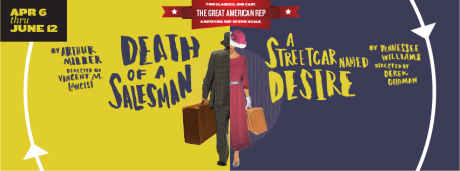The Great American Rep’s At Everyman Theatre has received critical acclaim from local critics. Beth Hylton, Carl Schuur, and Dawn Ursula talk about their roles and experience appearing in two classic simultaneously.
Joel: Please introduce yourself and tell our readers where they may have seen you perform on our local stages.

Beth: I am Beth Hylton, a member of the Resident Company at Everyman. Recent local performances include Rapture Blister Burn at Round House, Appropriate at Woolly Mammoth, and Outside Mullingar and Blithe Spirit at Everyman.
Carl: My name is Carl Schurr and Center Stage brought me from DC to Baltimore in the early 70’s and after my seasons there I began free lancing in regional theatre. In 2004 I made my Everyman debut in Proof and have done a large handful of shows both at the North Charles Street venue and now on West Fayette Street.
Dawn: I’m Dawn Ursula and as a company member with Everyman and Woolly, readers may have seen me perform in those venues. I’ve also worked recently with Round House and Theater J.
Why did you want to be part of the cast of the Great American Rep?
Beth: Who WOULDN’T want to be part of such an epic, ambitious project? I passed on several opportunities to make this long commitment work, but couldn’t have been happier to say “no”… And for an actor, that says A LOT. Firstly, it’s a company endeavor: in Salesman I am in the dressing room with all the ladies of the company, and that is the first time in my tenure that this has happened. And my goodness do we have fun!
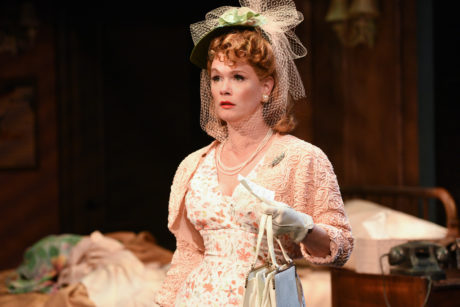
ClintonBPhotography.
When I am in Salesman I am support team, and to lend support to my favorite actors who also happen to be real-lifefriends is such a joy, and I am so grateful to be able to do it. I am on stage with Wil Love (Willy Loman) for about 90 seconds (he exits shortly after my entrance) but I am so proud to be there to help lift him up. Secondly, to play Blanche DuBois, to speak Tennessee Williams’ brilliant, beautiful poetry is a gift beyond, beyond, beyond compare.
Carl: As a member of the Resident Company, I was asked to be a part of The Rep.
Dawn: I’m lucky to call Everyman my artistic home and I couldn’t imagine not being part of this 25th anniversary and the monumental way in which we are celebrating.
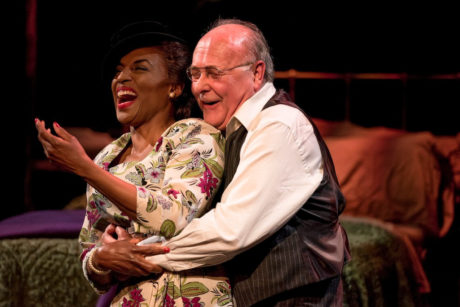
Who do you play in Death of a Salesman and A Streetcar Named Desire?
Beth: In Salesman I am Jenny (Charlie’s secretary) and Letta (Happy’s “date”) and in Streetcar I am Blanche.
Carl: Uncle Ben in Salesman and am a member of The Ensemble and The Doctor in Streetcar.
Dawn: I’m Ms. Frances in Death of a Salesman, better known as “The Woman” and Eunice in Streetcar.
Why are these two plays perfect to put together in a Rep? What common themes do they share? What plotlines are similar in both shows?
Beth: They are both about the loss of a dream, the meaning of the American Dream, and how we treat the least the among us. With refugee crises around the world, the talk around immigration in our own country, how we discard people who cease to have value to us– all of this still feels very alive and even urgent. Both Blanche and Willy are fighting for their own place in the world, to leave a mark, to have value, and there is so much in both plays about cruelty vs kindness. There is also a lot of self-deception in both of them–the lies they tell themselves in order to survive–and I think we can recognize that individually and culturally as Americans.
Carl: Both shows are indisputable classics and fit together beautifully in their timelessness and universality. Willy Loman is not only a relevant character of the late 1940’s but could very much be a man facing the slings and arrows of the 21st Century. Neither he nor Blanche in Streetcar are adept at accepting the worlds in which they live and become victims of their own making.
Dawn: I hope people will come and explore the answer to that question themselves. And if they are truly ambitious see both plays in one day for the full experience. It’s stirring to recognize the similar threads in both plays not only among the two protagonists, Blanche and Willy, but with some of the other characters and the relationships as well. The graphic for our shows is a beautiful illustration to accompany your question.
Do any of your characters that you play share similar traits and qualities?
Beth: Two out of three of my characters in The Great American Rep are working girls, and who knows what Jenny does outside of the office!
Carl: No.
Dawn: Both of them have a great capacity and need to be close and intimate with the man they’re drawn too.
Do the characters you play share similar challenges and are there any similarities in how they face and resolve these challenges?
Beth: Not really.
Carl: No.
Dawn: Interestingly, I can see a similarity in the challenges they face but their resolutions, or attempts at resolutions are very different.
How does the design help to tell the stories of these two iconic works? What impresses you the most about the design?

Beth: The two worlds feel so incredibly different. Salesman is spare and elegantly austere. Streetcar is a hot, messy, colorfully vibrant New Orleans. The worlds are different, not just in the set, but in the lighting, the soundscape, the costumes and wigs. I am deeply transported by the costumes in particular–living inside Blanche’s delicately colored world helps me know so much about her. Especially in contrast to the deep jewel tones of the set in Streetcar. I feel like I am set apart and it still gives me a place from which to begin my journey.
Carl: I assume you are asking about set design specifically. Daniel Ettinger’s great challenge was not only finding a specific look to embrace both productions but also finding a way to have both sets store easily and be easily changed from one to the other. It is a sign of his genius that Streetcar can be changed to Salesman and vice versa in less than an hour. Hats off to him and our amazing crew.
Dawn: So much thought by our incredible designers, all of them, to create these very different worlds that we inhabit in Streetcar and Salesman. Each show in its design tells the story with us and allows us to move and live with ease.
How would you describe the styles of your Directors Derek Goldman (A Streetcar Named Desire) and Vincent M. Lancisi (A Streetcar Named Desire)? How have they helped to mold your performances and helped to resolve the challenges you have faced while preparing for your roles?
Beth: This was my first time working with Derek. I love how detailed he is, and how invested he is in this play, and in collaborating. I started working on the script and preparing last Fall, and came in with lots of questions and some ideas he was more than happy to entertain and discuss. We did lots of emailing back and forth on off days (for Streetcar).In the room he was very present and supportive and active in problem solving. It all felt very front-footed and vital. I have worked with Vinny many times and he is, quite simply, my favorite collaborator. I always say about Vinny that he will call you in a lie (an actor lie) (and I always say, Every time an actor lies on stage, Tinkerbell dies) faster than any other director I know. When you are seeking truth, digging deep to illuminate integrity in every moment on stage, that is the most important thing you can have in a director. I had little to do in Salesman but felt him guiding the room in the authentic way he always does.
Carl: Both Vinny and Derek have great respect for the actors and while they allowed us to find our various characters on our own, they make certain that we fit into the entire picture. We are the trees and the directors must make certain that we are in the same forest.
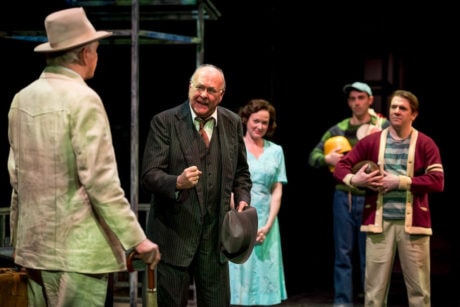
Dawn: Both of them are so collaborative and passionate about the plays. They are directors who engage and trust their actors and believe so much in the text. Always approachable and incredibly insightful.
What was the rehearsal process like and what did you admire most about your fellow cast members during the process?
Beth: I can’t say enough about this company. I just can’t. I am blown away by the specificity, the commitment, the urgency, the compassion and generosity in just every one’s work. It’s amazing. Danny and Chris play Stanley and Mitch in Streetcar and then Happy and Biff in Salesman. The rest of us have light duty in one of the two and more work in the other: watching the two of them gracefully navigate such heavy hitting in both has been truly invigorating to watch. Never a moment of leaning back, and exhilarating work in both. Mind blowing.

Carl: Kudos to the stage management staff for determining the daily schedules. Even though essentially the same family of artists were assembled in each session, there was a vastly different atmosphere in the rehearsal hall determined mostly by the individual scripts.
Dawn: Having not performed in a rep since grad school, it was challenging and exciting to leave one play and work on the other, toggling back and forth. This cast is phenomenal. They are so incredibly gifted at their craft and talented too. Their passion and desire to give their best is the model for what it means to be an artist.
What have you learned about yourself – the actor – during this whole process?
Beth: Well, after Blanche there isn’t much to be scared of. She is on all 103 pages of this massive, epic, operatic poem-play. I have a card I keep with me in my dressing rooms that reads “everything you want is on the other side of fear.” I feel like I have stayed a dragon with Blanche, and honestly, while I will still be working on all the layers and nuances, the connections and moments of this play until the final closing moment on June 12th, I feel so lucky and alive on stage with my incredible, inspiring colleagues, as Blanche. I cannot slip for one moment in my concentration: if I falter for one moment the next moment is lost. It’s truly what all acting is, writ large, and I know I will take this lesson into everything I do going forward. While not everything will be Streetcar and not every role will be Blanche, all works (once you have accepted the offer to participate in them) deserve the same worthy attention as an artist.
Carl: To do my homework before coming to the theatre…but then I’ve always known that.
Dawn: That I am real, real, lucky! This has been such a gift.
Why do you think Death of a Salesman and A Streetcar Named Desire are still so popular and what do these shows have to say to today’s theatregoers?
Carl: In addition to the universality an accessibility of each script, one realizes that there is simply no substitute for a good story. Tragic though the tales may be, we quickly become embraced by the journeys of Willy and Blanche.
Dawn: The language is beautiful, the stories are gripping. The characters are wonderfully flawed, and sympathetic and human and familiar.
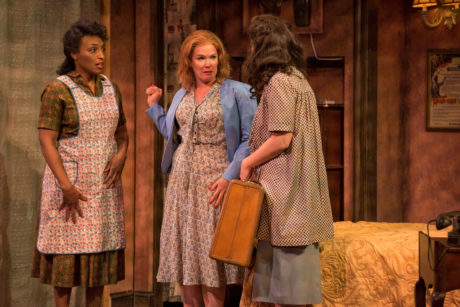
What’s next for you on the stage after the Rep is over?
Beth: Vacation! In the fall I will be back at Woolly in the world premiere of Jen Silverman’s Collective Rage and at Everyman for Jen Silverman’s The Roommate (my Jen Silverman season!) and some other things on tap at Everyman, plus auditioning in NYC and the regions.
Carl: Enjoying some quiet time in the country.
Dawn: Next is another rep! Angels in America 1 & 2, a co-pro with Round House and Olney.
Death of a Salesman plays in The Great American Rep with A Streetcar Named Desire through June 12, 2016 at Everyman Theatre – 315 West Fayette Street, in Baltimore, MD. Tickets can be purchased at the box office or online.
LINKS:
The Great American Rep: ‘Death of a Salesman’ at Everyman Theatre reviewed by Patricia Mitchell on DCMetroTheaterArts.
Review: The Great American Rep: ‘A Streetcar Named Desire’ at Everyman Theatre by David Gerson on DCMetroTheaterArts.


